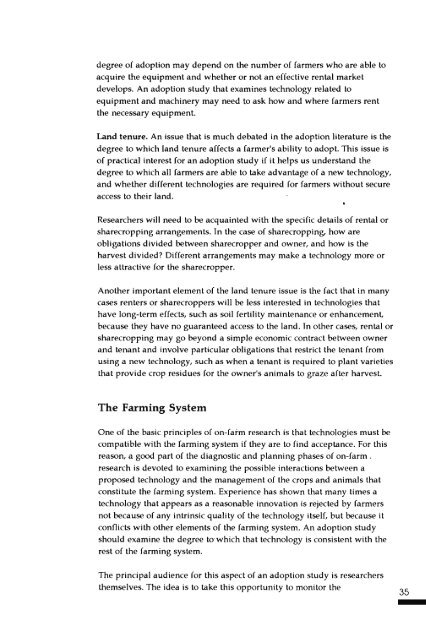The Adoption of Agricultural Technology - Food Security Group
The Adoption of Agricultural Technology - Food Security Group
The Adoption of Agricultural Technology - Food Security Group
You also want an ePaper? Increase the reach of your titles
YUMPU automatically turns print PDFs into web optimized ePapers that Google loves.
degree <strong>of</strong> adoption may depend on the number <strong>of</strong> farmers who are able toacquire the equipment and whether or not an effective rental marketdevelops. An adoption study that examines technology related toequipment and machinery may need to ask how and where farmers rentthe necessary equipment.Land tenure. An issue that is much debated in the adoption literature is thedegree to which land tenure affects a farmer's ability to adopt. This issue is<strong>of</strong> practical interest for an adoption study if it helps us understand thedegree to which all farmers are able to take advantage <strong>of</strong> a new technology,and whether different technologies are required for farmers without secureaccess to their land.Researchers will need to be acquainted with the specific details <strong>of</strong> rental orsharecropping arrangements. In the case <strong>of</strong> sharecropping, how areobligations divided between sharecropper and owner, and how is theharvest divided? Different arrangements may make a technology more orless attractive for the sharecropper.Another important element <strong>of</strong> the land tenure issue is the fact that in manycases renters or sharecroppers will be less interested in technologies thathave long-term effects, such as soil fertility maintenance or enhancement,because they have no guaranteed access to the land. Tn other cases, rental orsharecropping may go beyond a Simple economic contract between ownerand tenant and involve particular obligations that restrict the tenant fromusing a new technology, such as when a tenant is required to plant varietiesthat proVide crop residues for the owner's animals to graze after harvest.<strong>The</strong> Farming SystemOne <strong>of</strong> the basic principles <strong>of</strong> on-farm research is that technologies must becompatible with the farming system if they are to find acceptance. For thisreason, a good part <strong>of</strong> the diagnostic and planning phases <strong>of</strong> on-farm.research is devoted to examining the pOSSible interactions between aproposed technology and the management <strong>of</strong> the crops and animals thatconstitute the farming system. Experience has shown that many times atechnology that appears as a reasonable innovation is rejected by farmersnot because <strong>of</strong> any intrinsic quality <strong>of</strong> the technology itself, but because itconflicts with other elements <strong>of</strong> the farming system. An adoption studyshould examine the degree to· which that technology is consistent with therest <strong>of</strong> the farming system.<strong>The</strong> principal audience for this aspect <strong>of</strong> an adoption study is researchersthemselves. <strong>The</strong> idea is to take this opportunity to monitor the35



